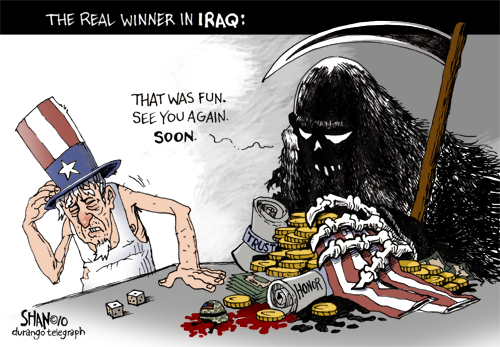.
Posted on December 25, 2011.

The Americans retreat from Iraq, leaving behind a disastrous legacy.
“History will judge the original decision to go into Iraq.” While the last GIs will pack up and leave the land of Mesopotamia without regrets by the end of the year, Barack Obama has adopted a rather modest tone. The American president, of course, unconvincingly recites the obligatory triumphant remarks: Democracy has been installed, and economic development will follow. But he is under no illusions. His actions contrast sharply with George Bush’s loud and careless cry of “mission accomplished” on the flight deck of the aircraft carrier Abraham Lincoln on May 1, 2003.
The last nine years of intervention amount to a historic disaster: over 4,400 American soldiers killed and 32,000 wounded; there are 150,000 dead and 250,000 wounded on the Iraqi side. Two million have been exiled. The financial cost is also exorbitant — around $1 trillion.
Geopolitical Catastrophe
The Iraq expedition, championed by George Bush and the feather-brained hawks who surrounded him, is, above all, a geopolitical catastrophe. The destruction of Iraq has opened a path for Iran. The Shatt al-Arab river is no longer a frontier between the Shiite and the Sunni worlds, between the Persians and the Arabs.
The Shiite prime minister, Nouri al-Maliki, put in place by Washington, has but one single concern from now on: to please Iran, where he lived in exile for many years. With allies like Maliki, the Americans have no need for enemies. Maliki behaves, moreover, as a dictator-in-training, imprisoning those who displease him without batting an eyelid.
Parochial Shocks
Unfortunately, it is very likely that in the coming months, if not weeks, the confrontation between the Shiite majority and the Sunnis will escalate. Then there is the fate of the unhappy and dwindling Christian community, which will effectively vanish very soon. On a regional scale, the “spread of democracy” put forth by George Bush has never worked. The Arab Spring, arising eight years after the invasion of Iraq, bears no relation to the overthrow of Saddam Hussein.
In Tunisia, as in Cairo, Benghazi or Homs, endogenous causes have provoked explosions of anger among the people. The electoral victory of Muslim fundamentalists in Tunisia, Egypt, Libya and Syria will undoubtedly follow. The landscape is bleak between the Nile and the Euphrates.

We will soon be looking at the wreckage of every radical jihadist umma-wannabe, and good riddance.
Religion is a choice, and choosing a religion that presents a political and battlefield conflict with the USA is dumb. As the internet spreads, and knowledge increases, political religion of all kinds will die.
I’m a lib to the core, but in a certain sense, I can see how GWB’s blunder did contribute to the Arab Spring, in the sense of, ‘you wanna see a democratic revolution?? we’ll show you a REAL democratic revolution!’